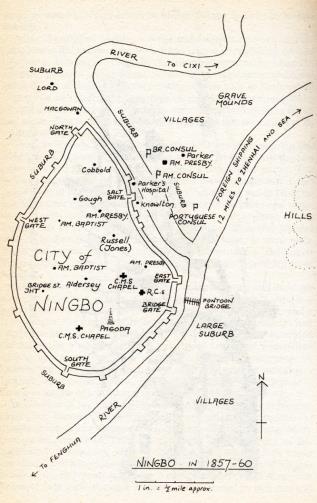1860s & 1870s

Ningbo emerged as the hub of Christianity in Zhejiang. This 1860 map shows each church and mission home in the city.
A Firm Foundation
Because of its status as one of the five "treaty ports" in China at the time, Ningbo remained a key center of mission activity throughout the 1860s. Scotland-born William Parker and his wife arrived in March 1862, in the midst of the Taiping Rebellion. Ningbo was controlled by the rebels at the time and no mission work was possible. That summer, however, the rebels were expelled by British and French troops, and Parker was soon hard at work.
The following year, right when it seemed Parker was beginning to reap from his faithful sowing, he was returning home on horseback one afternoon when he rode across a bridge over one of the narrow canals in the city. Suddenly,
"A stone slab of the bridge gave way, and he was precipitated into the canal, receiving injuries which proved fatal a few days afterwards. This was a heavy blow to the young and still feeble mission, but Ningbo was not left long by our Church without a witness to the truth, for by April 1864 Dr. John Parker was carrying on the work of his lamented brother."[1]
From the beginning, most of the Chinese converts in Zhejiang were instructed by the missionaries not to look for handouts. If a group of local believers needed a chapel or church building, they were expected to pool their resources and trust God to provide. If they wanted to support an evangelist, it was made clear to them that the responsibility was theirs. As a result, the Zhejiang churches were taught to depend upon God and not foreign funding. This established them on a strong foundation, and when storms of persecution later swept in—including ultimately the removal of all foreigners from China—the body of Christ in Zhejiang stood firm and was able to survive the onslaught.
Looking back, the Zhejiang missionaries' insistence that local believers lead and fund the work of the gospel undoubtedly played a large role in bringing about the situation we have today, where the province has the highest percentage of Christians of any province in China. A Zhejiang missionary, John Butler, expounded on the benefits of weaning the local churches from the dependency on outside funding:
"When the multitude that followed our Lord found that there was no worldly advantage to be gained from connection with Him, but rather that discipleship involved self-denial, hardship and persecution, many of them followed no more with Him. When the pressure of self-support is brought to bear upon a congregation of converts from heathenism, it often results in some being offended and falling away. But it just as often results in bringing to light cases of earnestness, zeal and liberality far beyond your expectations."[2]
The foundation that was laid during the first 20 years of Evangelical endeavor in Zhejiang began to reap rewards in the 1870s. A 1876 report noted:
"Nine years ago...there was not one Christian in Shaoxing; but the gospel was preached, and, as a result, we now have a church of 70 Christian disciples, besides about 30 enquirers in whom we have hope. Two other missionaries in the same city have also about 20 converts each. In the Fenghua District, Mr. Crombie has about 50 converts, and here in Hangzhou we have over 40."[3]
Trophies of Grace
One of the early church members in Ningbo was a believer named Chu who had fallen into the hands of bandits. The evil men branded him on his cheek and forehead, forever marking him as one of their own. The branding made escape almost impossible, as imperial soldiers were accustomed to beheading anyone they came across who was branded in this manner.
When the Ningbo church found out what had happened to Chu they began praying earnestly for him every day. Then,
"To their joy and amazement one morning he walked into their meeting, but so altered as to be scarcely recognizable. He told a marvelous tale of God's preserving care, and of the preciousness he had found in the Word of God as his only companion and comfort. He read it night and morning with the feeling that it might be the last time he would be permitted to open his precious New Testament. The deep scars on his face were produced partly by the branding, and partly by the surgical operations he underwent for the removal of characters which might have cost him his life."[4]
Chu went on to become one of the leaders of the body of Christ in Ningbo. He led many people to the Lord Jesus Christ with his gentle and persuasive preaching style.
Another pastor, Xiang Xiaoyong of Shaoxing, recalled how he was influenced to become a Christian as he traveled throughout Zhejiang:
"I heard an old man from the country speaking very earnestly. This, together with the sight of so many natives worshipping and believing, much impressed me. On the return journey I saw many believers...several of whom exhorted me. I said to myself, 'All of these people are believers; they are all intelligent persons; shall I be left behind?'
And again, I was much struck by seeing foreigners frequently on their knees, praying; though, for the life of me, I could not make out at the time what they were doing; at last I concluded that they must be worshipping the God whom they exhorted us to worship.... Thus I was persuaded. I determined to give myself to Jesus, and He received me."[5]
Overcomers for Christ
As the number of Christians increased throughout the province, incidents of persecution also rose. When discovered, converts were often beaten by family members, who felt they had brought disgrace on their ancestors by embracing the 'foreign doctrine.' One young man, a dwarf, was prohibited from attending Sunday services by his father-in-law and uncle, and their friends.
Undeterred, the man found a way to escape their clutches and attend the weekday meetings. His relatives beat him for this, they bound him with ropes and cast him out of the family home. When they took his property and told him he could no longer have his wife, he replied: "No matter, when my father and my mother forsake me, then the Lord will take me up." After being invited to stay in a room connected to the chapel, the young man said, "Now I am blessed. I am where I can hear the truth continually; they have frustrated their own ends."
His family would not give up, however, and made one last attempt to "bring him to his right mind." A report in 1875 noted:
"His father-in-law, uncle, brother-in-law, and even his own wife came to him, and with tears besought him to change his mind. It was a trying moment, and those who were watching him trembled for the result; but grace triumphed, and for some time he has been left in peace. Already his consistent conduct is having its result, and the brother-in-law who beat and opposed him is now inquiring for himself about the gospel which he previously hated."[6]
While Christian influence in Zhejiang was still minimal, the Christians were treated as a curiosity by the general population. When fellowships of wholehearted believers sprang up in hundreds of locations throughout the province, however, trouble soon followed. Many reports of cruel persecution came in, but most believers maintained their faith in spite of overwhelming pressure. Even non-Christian landlords who had rented homes to the missionaries were tortured by enraged judges. One landlord was "compelled to kneel on red-hot iron chains until the flesh was burned to the bone, after which the judge beat him so cruelly that for a time no hope was entertained of his life."[7]
At Shaoxing—a city once nicknamed the 'Ephesus of China' due to its prominent idol industry—missionary James Meadows visited a new believer who had already experienced much abuse at the hands of his relatives and neighbors. Meadows remarked:
"His father was outraged, and determined to prevent him having anything to do with the hated religion of Jesus.... The father had a long heavy chain forged, and bought a big stone with holes for the chain.... He lifted up his hands to heaven, and declared that he would either discard his son, or sell him to the foreigners, or he should be chained in front of the house as one who was not fit to roam at large, seeing he was bewitched by the religion of the red-haired men. The mother-in-law declared her intention to commit suicide; the wife determined she would no longer be his wife; and the clan, or tribe, resolved to cast him out of their midst."[8]
Despite the enormous pressure to recant, this man remained faithful, and a short time later was publicly baptized into the body of Christ. He, and many others like him, became key living stones in the foundation of the Church in Zhejiang. Later generations of believers followed their shining examples and remained faithful even unto death.
A Decade of Breakthroughs
As the 1870s wound down, the Living God looked down from heaven upon Zhejiang and saw a strong and growing Church forming throughout the province. The decade had witnessed many breakthroughs for the gospel, and the body of Christ had increased in grace and in number.
One example of encouraging growth occurred in the mountainous village of Zhuji, which is now a city in its own right, located 40 miles (65 km) south of Hangzhou. One day in the 1870s, a man from Zhuji visited Hangzhou and walked past the chapel, which was not being used at the time. He caught sight of the words 'Holy Religion of Jesus' on a sign above the door and asked the neighbors what the word 'Jesus' meant. They directed him to the mission home in the city, and over time this inquisitive man became a sincere follower of Christ. He carried the gospel to his native village, and from that humble beginning the church in Zhuji grew to more than 500 baptized believers.
The growth of the gospel in Zhejiang was not evenly spread, however. At Huangyan the missionary lamented at having baptized just two converts after nine years, one of whom died, while the other seldom attended the services. At this low-ebb, the Holy Spirit began to move in Huangyan, even though the missionary was a cessationist, believing that miracles no longer occurred.
Despite the missionary's lack of faith, before long 25 people at Huangyan had placed their trust in Christ. The startling breakthrough occurred after a poor visiting evangelist named Xiang Yongkou read in the Scriptures that Jesus healed the sick when He was on the earth. He concluded that if people prayed in faith, God would continue to make them well, and so he began a ministry of healing. The astonished missionary conceded: "This soon spread, and others called these men to pray for their sick folk, and they recovered. Others tried the same plan with a like result. Now the chapel is too small to hold the people that attend, and we are trying to get a more suitable one."[9]
Evangelist Xiang continued praying for the sick and seeing them healed for many years. A missionary at Taizhou reported:
"Xiang Yongkou was the first person converted in the Prefecture of Taizhou, and was baptized in April 1869.... So full was Yongkou of the new truth he had received that he was compelled to tell it to others.... The secret of his success seems to be his implicit faith in prayer. Tell him that God does not answer prayer, and he will soon give you instances of God having answered his prayers.
He has prayed over the sick, taking James 5:15 literally. Sometimes he has called others to go with him, and sometimes he has gone alone, and the sick have recovered. I visited those who have been healed in their homes, and heard from their own lips how they began to recover from the time he prayed by their bedside. Some were cases of dysentery, where there seemed no human hope of recovery, others of continued fever, etc. At one place several were raised up this way, and it led to the conversion of some; and, as a result, an idol temple has been turned into a chapel, and over 50 persons have been baptized."[10]
In the 1870s, a number of remarkable statements of faith were uttered by missionaries and Chinese believers about the future blessing God would bring to Zhejiang. The men and women who spoke these prophetic utterances did so with few visible signs of encouragement, yet they somehow caught a glimpse of a far-off day when masses of people in Zhejiang would worship the Lord Jesus Christ. In a letter written in November 1878, James Meadows told of four new converts, before declaring:
"We thank God for these four souls, and for eight other candidates at the same place. But what are four among so many? Oh, that we could write to you and our friends at home of four thousand or even four hundred receiving the gospel at once! Well, if the Lord Jesus could make five loaves and two small fishes go so far among 5,000 persons, satisfying their hunger and making them to feel comfortable and happy, truly He can make even four souls of much use, and fit them to accomplish much in His blessed kingdom and service.
We long as much for quality as we do for quantity. If we had the former, in the shape of a deeper work of grace in all our hearts, the latter would then be its natural outcome; and we would see the lame man leap as the deer, and hear the tongue of the dumb sing. We would then see the waters break out in the wilderness, and streams in the desert. May God hasten this happy day!"[11]
© This article is an extract from Paul Hattaway's book 'Zhejiang: The Jerusalem of China'. You can order this or any of The China Chronicles books and e-books from our online bookstore .
1. Duncan McLaren, Missions of the United Presbyterian Church: The Story of our Manchurian Mission (Edinburgh: Offices of the United Presbyterian Church, 1896), p. 12.
2. John Butler, "Protestant Missions in the Cheh-Kiang Province," Chinese Recorder and Missionary Journal (July 1880), p. 289.
3. "Hang-chau Conference," China's Millions (August 1876), p. 176.
4. "The Native Pastor, Mr. Chu," China's Millions (March 1876), p. 114.
5. "Conversion of a Native Pastor," China's Millions (July 1875), p. 3.
6. "The Power of the Gospel," China's Millions (August 1875), p. 24.
7. China's Millions (April 1878), p. 54.
8. Mr. Meadows, "The Work in Shaohing," China's Millions (October 1877), p. 125.
9. "Tai-chau, Cheh-kiang Province, South-east," China's Millions (October 1879), p. 129.
10. W. D. Rudland, "The Story of the First Convert in Tai-chau," China's Millions (October 1883), p. 143.
11. Mr. Meadows, "The Work at Ning-po," China's Millions (April 1879), p. 48.





